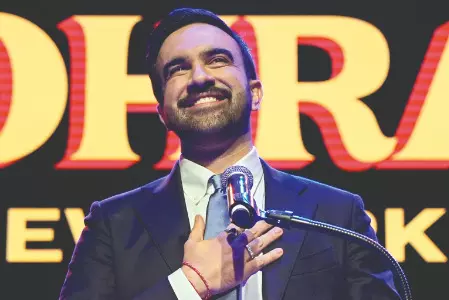A New American Identity
Zohran Mamdani’s unapologetic embrace of faith and heritage marks a generational shift—Muslims in America are no longer seeking acceptance but leading change, proudly in the light

The new mayor of New York, Zohran Mamdani’s stupendous electoral success and rising political influence mark a milestone in American politics, symbolising a growing sense of empowerment among American Muslims and a continued movement beyond the post-9/11 climate of stigma.
There was a time when former US President Barack Hussein Obama was visibly cautious about his middle name. During his 2008 campaign, opponents and far-right media figures deployed Islamophobic smear tactics, labelling him a “secret Muslim.” Some television hosts even deliberately confused his name with Osama bin Laden. Mamdani, however, represents a striking contrast. He is unapologetically proud of his Islamic faith and Indian — especially Gujarati — roots, and he has even used Bollywood clips in his campaign advertisements.
As Mamdani gained prominence, his critics resorted to rhetoric similar to that used against London Mayor Sadiq Khan. He was accused of promoting Islamic extremism, labelled a “supporter of ISIS,” and smeared as a communist. One radio commentator went so far as to claim, “God forbid, if another 9/11 happens, he would be cheering.” These attacks echo the Islamophobic narratives weaponised against Muslims in public life since 2001.
Growing up as a Muslim in Queens, New York, Mamdani witnessed firsthand the racial profiling and humiliation Muslims endured after 9/11. He once received advice from an uncle to keep his Muslim identity in the shadows — advice he initially followed. But as he campaigned to make New York more affordable and equitable, his faith gradually returned to the forefront. Now, Mamdani boldly asserts: “I will not change who I am, how I eat, or the faith I’m proud to call my own. But I will no longer look for myself in the shadows. I will find myself in the light.” When asked about his favourite food, he replied “halal chicken and rice” — a subtle but deliberate affirmation of identity.
In many ways, Mamdani has emerged as a collective voice for American Muslims, especially those in New York, who no longer wish to live under the shadow of 9/11. They seek visibility, dignity, and a rightful place in American society. With an estimated 80,000–100,000 Muslims in New York City, Mamdani’s rise reflects the growing political strength of this community.
Like Ilhan Omar and Rashida Tlaib, Mamdani represents a generational shift defined by visibility and empowerment. He is unapologetically open about his faith, heritage, and progressive politics. His success signals that Muslim Americans are not merely participating in public life — they are reshaping it. The
community has evolved from being viewed as “othered” to asserting a confident place within the American political mainstream. More than 24 years after 9/11, Muslims in America have steadily built a broad-based, progressive political presence.
Mamdani’s decision to embrace his identity publicly is more than personal — it challenges the notion that Muslim dignity in America must be conditional or hidden. By refusing to downplay who he is, Mamdani declares: no more.
He has reframed Muslim identity from a perceived political liability into a source of strength. His unapologetic stance turns identity into celebration — a defiant rejection of fear-based politics and bigotry. In doing so, Zohran Mamdani stands as a powerful symbol of Muslim Americans’ arrival, confidence, and growing influence in the political landscape of the United States.
Views expressed are personal. The writer has worked in senior editorial positions for many renowned international publications



